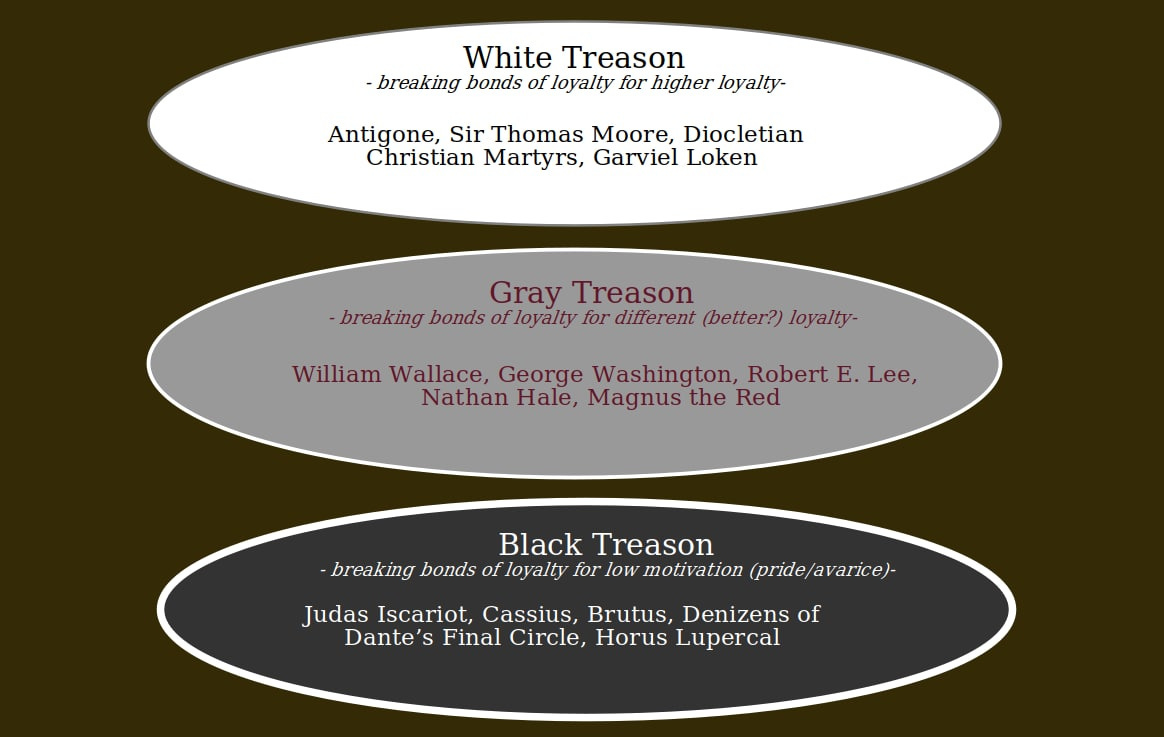Why Hanlon's Razor Is Wrong, And They (Probably) Are Out To Get You
A recurring point of discussion and debate which is reflective of our times is whether the ruling class and their system are malicious or merely incompetent. I've touched on this issue before in one of my outdoor videos It's malice, not incompetence, focusing on the politics of mass immigration. Now, with Covid-19 behind us, many establishment intellectuals and pundits are struggling to explain why they ‘‘got it wrong’’ or even if they did get it wrong.
One such debate is between Brett Weinstein and Sam Harris, two once stalwarts of the ‘‘Intellectual Dark Web’’ with somewhat similar backgrounds and identities. During the Covid saga, Weinstein hosted the dissident doctors and skeptics of the narrative, and Harris was firmly in the establishment camp. Another, less intellectually stimulating, arena of the debate is that of Piers Morgan having to explain why he ‘‘got it wrong’’. Morgan's line is ‘‘I changed because the science changed’’.
The Sam Harris camp believes that mistakes may well have been made, but the situation was dire, and erring on the side of caution was warranted. Weinstein believes in the idea that a network of powerful acted immorally to benefit themselves. In Britain, the discourse relating to asylum seekers and immigration follows a similar trajectory, with some people lambasting the government as being useless, weak, or, indeed, incompetent. Others, myself included, view their policies and actions with malicious intent.
Here, then, we come to the much-used aphorism known as ‘‘Hanlon's Razor’’ which holds:
Never attribute to malice that which is adequately explained by stupidity.
Many commentators, myself included, have playfully pointed out that the opposite is true, and the line should read ‘‘Never attribute to stupidity that which is adequately explained by malice’’. The danger here of course is that the individual can be accused of being overly paranoid and ‘‘schizo’’. If I step out of my front door and into a dog turd on the step, it probably wasn't done out of malicious intent, but rather the result of laziness or stupidity on the part of the dog owner. However, if the same scenario presents itself to me every day for a week or a month, I can reasonably begin to question the motives of the owner.
The motive, the intent, is the key here.
In Robert A Heinlein's novella Logic of Empire, Heinlein depicts a colony on Venus that has adopted slavery as means of economic production — not through malice or the wish to enslave, but because it is the most utilitarian policy at the administrator's disposal. Similarly, in Brian Herbert's Dune prequel The Butlerian Jihad, the outright rejection and fear of computers have made it necessary to enslave humans to do the work once done by robots and AI. A character in Heinlein's novella responds to a criticism of the proslavery colony with:
‘‘You have attributed conditions to villainy that simply result from stupidity’’
To Steel-man this position somewhat, a badly designed system is not inherently wicked if it is the result of an emergent phenomenon. The system may seem evil to the slaves on Venus, just as it might to the denizens of the USSR, but the question is whether the systems were simply badly designed or designed to be wicked. In the case of the USSR that is a hotly debated topic, still to this day.
There is of course a middle ground between the two poles. That which we may call ‘‘indifference’’.
Multiculturalism in Britain was never demanded by the public but imposed upon the population by the ruling class. The ruling class always knew that the public opposed the policies, but it didn't matter, the demographics were, and continue to be, changed regardless. Many people have come to the conclusion that mass immigration into formerly white countries is deliberate and malevolent and, indeed, genocidal by design. The ‘‘softer’’ line of reasoning holds that it is continually mismanaged immigration policies by politicians who have no idea what they're doing. Yet another could be that the line on the graph must go up and, whether the natives like it or not, mass immigration is an economic necessity.
It has long been my view that deploying the incompetence argument to explain mass immigration is both absurd and thought-terminating. There exists a bureaucratic behemoth of social engineering policies, re-education legislation, and infrastructure to facilitate the entry of literally millions of foreigners into the country as well as the means by which restless natives can be punished and ostracized for objecting. Furthermore, the government is well aware of the negative outcomes for the natives in terms of housing, work, crime, and even terrorism and rapes being committed due to these policies.
At best, then, the ruling class is indifferent to the well-being of the people over whom they govern. Hanlon's Razor fails to adequately explain multiculturalism. The people who believe in the ‘‘Great Replacement’’ ascribe malicious intent, and those left with the emergent economic argument are conceding that the elites are at best unconcerned with the native population. The dichotomy now is: they either hate you or they don't care about you.
The individual who learns to live with destructive policies and ideas on the basis that those imposing them are merely stupid invites himself to live with fatalistic apathy and perhaps even nihilism. What's more, having ostensibly understood the root cause of the problem he needs to search no longer, be inquisitive, or entertain other perspectives. In this way, the incompetence argument allows villains to be free of scrutiny and, most important of all, moral condemnation.
As a rule of thumb, and that is what Hanlon's Razor is if people veer toward the idea their rulers are untrustworthy and ill-intentioned, or indifferent, the onus is on the rulers to prove themselves worthy and those distrustful incorrect. As long as the ruler is allowed the wiggle room of being thought of as a moron, no moral condemnation can really stick.
Within this context, Hanlon’s Razor is what could be described as a ‘‘Normie’’ or centrist position to hold due to its lack of cynicism and skepticism. Fundamentally the politicians, institutions, and policies are well-meaning, even if poorly thought out or implemented.
In his arguments in defence of the severe measures deployed during the pandemic, Sam Harris adopts the airs of the pure rationalist. It’s a straightforward numbers game in which experts and scientists have more data, and more expertise, than some guy online watching Bitchute videos, which is true. However, the motives of the skeptics are not primarily their expertise in virology, but distrust in the authorities and institutions dictating policy — especially when the incentive structures are brought into the equation.
The final death blow to the incompetence argument is their reliance on the power structure being objective and not driven by profit, ideology, consolidating power, or self-interest. The institutions are not infallible, but they’re not inherently corrupt either. The allegation of ‘‘conspiracy theorist’’ being hurled at those who point to the networking of powerful actors I addressed recently in another article.
In a discussion with The Distributist last year, we explored the nature of treason and treachery. The Distributist came well-prepared with an infographic breaking down the differing degrees of treason:
I couldn’t help but be reminded of the tiers of treachery when ruminating over conceptualizing Hanlon’s Razor in the scale outlined above:
Incompetence > Indifference > Malice
Whatever destructive policy or idea we can name, from transgenderism to mass immigration, Covid policies, or Climate Hysteria, incompetence is the least likely reason. Note, for example, that all of this alleged stupidity only ever benefits the powerful to the detriment of the powerless. We could at least expect the pendulum to swing in our favour from time to time, even if only by chance, but it doesn’t.
Thus, we are left with indifference and malice as an explanation for the behaviour of our elites. In the infographic above, we can see this correlates neatly with gray treason and black treason. An example of grey treason in our context would be politicians forcing vaccines on the general population, without knowing their safety and efficacy. An example of black treason would be politicians continuing the rollout of the vaccines while being fully aware of various serious side effects.
The grooming gang issue in Britain is yet another example of the lines between grey treason and black treason, or indifference and malice, becoming very blurred indeed.
It stands to reason that to begin processing an event or policy, one is at a severe disadvantage if the default setting is trust in authority and explaining away any mistakes as mere incompetence. In actual fact, I believe it offers something of a shield and bolt-hole to those with a vested interest, financial or otherwise, in protecting Power from criticism.
The line between indifference and malice is a fine one indeed, however we can easily replace the word indifference with the word callous, and the transition between the two jells more comfortably.
In the final analysis, the rational and most reasonable means by which the zeitgeist can be processed is to assume callousness, if not downright villainy, on the part of the ruling class. Conspiracy theorists often assume too much malice on the part of the elites, but as the years have shown, they’re more often correct than the narrative trusters, unfortunately.





As an aside, which relates to the conversation in the thread. Truth Stream Media who produce very thoughtful work in this area recently, on their second video about The Shining, said that the industrial revolution and in particular the invention of the steam engine was a result of an organized group with an agenda. I think ''The Moon Company''.
This I found interesting because the steam engine has long been my go-to example of an emergent, but world changing development. The point being, if history was pre-planned then there are limits on the scale of the plan due to technological innovation which would change the world.
To my surprise, they suggest even that is part of a plan. But this needs further investigation on my part.
Whether it’s incompetence (it’s not), indifference or malice, the outcomes are still the same. Malice should be assumed by default because the outcomes are evil. The regime and its enjoyers are really fond of “ignorance of the law is no excuse” except of course when it comes to their policy outcomes.
We should never grant any charity to the motives of these people. Start at any point in time during the past 60-70 years, hell the past 6-7 years especially and it’s crystal clear that their motives are malicious.